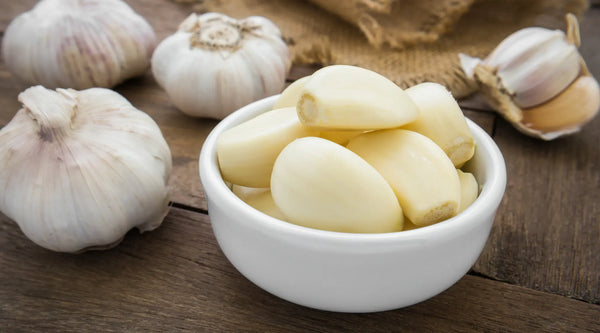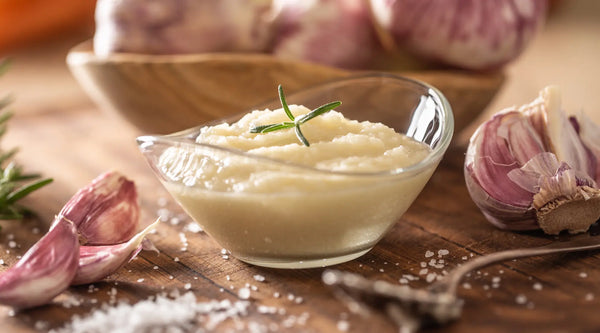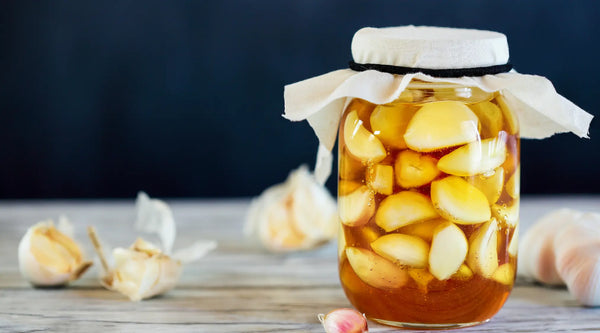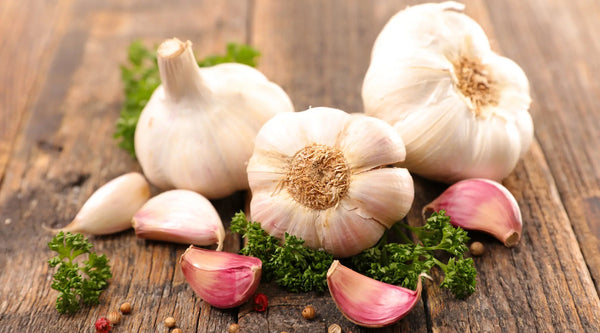-
Garlic lowers uric acid levels and has anti-inflammatory properties, making it beneficial for gout management.
-
It can be used in various forms, including fresh, cooked, or as a supplement, to alleviate gout symptoms and prevent attacks.
-
While generally safe, garlic may cause digestive issues and interact with certain medications, advising consultation with a healthcare provider.
-
Garlic is most effective as part of a comprehensive gout management plan, including diet and lifestyle adjustments.
-
Products like Alerna's Uric Acid Support can enhance garlic's benefits, offering a holistic approach to managing gout.

Gout is characterized by sudden, severe attacks of joint pain, redness, and tenderness. It is caused by elevated levels of uric acid in the blood, which forms crystals in joints and tissues, leading to pain and inflammation.1
This article explores garlic's medicinal properties, its benefits for gout sufferers, and the scientific evidence backing its use.
Garlic: A Culinary Staple with Medicinal Properties
Garlic isn't just for adding flavor to your favorite dishes; it's also packed with health benefits. It is rich in bioactive components such as allicin, which is responsible for its characteristic smell and most of its therapeutic effects.2
Beyond its well-documented roles in improving heart health and boosting the immune system, garlic also possesses anti-inflammatory and antioxidant properties. These properties make it an excellent candidate for addressing various conditions, including gout, by targeting underlying mechanisms such as inflammation and the accumulation of uric acid crystals.3
It's known for boosting heart health and the immune system, and its anti-inflammatory and antioxidant powers might just make it a useful ally against gout by tackling the inflammation and high uric acid levels that cause all that joint pain.
Potential Benefits of Garlic for Gout Sufferers
Gout patients may use garlic's anti-inflammatory abilities to ease the pain and swelling of gout attacks. It might even help prevent those attacks by lowering uric acid levels.
Garlic works by promoting the elimination of excess uric acid through the kidneys and eliminating excess uric acid in the body.4 Its antioxidant effects contribute to neutralizing free radicals, thereby reducing oxidative stress, which is often elevated in gout sufferers.
All in all, garlic offers a two-pronged strategy for managing gout: calming down symptoms and tackling the root cause.

Scientific Evidence and Studies
Research suggests that people who take garlic supplements can see a significant drop in their uric acid levels.
One study demonstrated that subjects who consumed garlic extract showed a marked decrease in serum uric acid levels compared to those who did not.4
Another study highlighted garlic's effectiveness in inhibiting the activity of xanthine oxidase, an enzyme involved in the production of uric acid. Thus, garlic offers a dual approach to managing gout: reducing inflammation and lowering uric acid levels.3
These findings provide a scientific basis for the traditional use of garlic in treating gout and other inflammatory conditions.
How Much Garlic Should You Consume?
When it comes to using garlic for gout, balance is key. You might wonder just how much garlic is the right amount to help manage gout without going overboard.2 Here's a simple guide:
-
Fresh Garlic: Start with 1-2 cloves per day. Garlic is potent, and a little goes a long way in both flavor and health benefits.
-
Garlic Extract: If you prefer supplements, around 600-1200 mg per day is recommended. This is roughly equivalent to about two cloves of garlic.
-
Consultation: Always check with a healthcare provider before adding garlic supplements to your routine, especially if you're managing other health conditions or taking certain medications.

How to Use Garlic for Gout
Using garlic to reduce uric acid levels can be both effective and delicious. Here are some ways to integrate garlic into your gout management plan:
-
Raw Garlic: Chop or crush fresh garlic cloves and let them sit for a few minutes to activate the allicin. You can then swallow the chopped garlic with water or add it to salads and dishes.
-
Cooked Garlic: Add minced garlic to your cooked meals. Cooking garlic can make it easier to digest for some people, although it might slightly reduce its allicin content.
-
Garlic Supplements: If you're not a fan of garlic's strong taste, garlic supplements can be a convenient alternative. Just make sure to choose a high-quality brand that specifies the allicin content.
How to Incorporate Garlic into the Diet
Garlic consumption is not only beneficial for managing gout; it also adds delicious flavor to your meals. Here are some tips:
-
Garlic-Infused Oils: Create your garlic-infused olive oil by soaking garlic cloves in olive oil. Use it as a salad dressing or for cooking to add a subtle garlic flavor to your dishes.
-
Garlic in Cooking: Add minced or crushed garlic to soups, stews, sauces, and marinades. Garlic pairs well with certain foods, enhancing the taste of vegetables, meats, and even some desserts.
-
Roasted Garlic: Roasting garlic softens its flavor and adds a sweet, caramelized taste to any dish. Simply cut the top off a head of garlic, drizzle with olive oil, wrap in foil, and bake until tender. Spread on bread or mash into dishes.
-
Incorporate into Snacks: For a healthful snack option, mix finely minced garlic into dips, spreads, or hummus.
While garlic can be a helpful addition to a gout management plan, it's also important to maintain a balanced diet, stay hydrated, and follow any treatment plans prescribed by your healthcare provider.

When to Use Garlic for Gout
Incorporating garlic into your gout management strategy can be advantageous at different times, depending on your goals—whether you're looking to prevent flare-ups, alleviate symptoms during an acute attack, or contribute to long-term management.5 Here’s how to effectively time your garlic intake:
As a Preventive Measure
-
Daily Diet: Regular consumption of garlic as part of a balanced diet can help keep uric acid levels in check, potentially preventing dreaded gout attacks from occurring.
-
Lifestyle Integration: Include garlic in your cooking routines, salad dressings, or as a supplement to steadily benefit from its anti-inflammatory and uric acid-lowering effects.
During Acute Gout Flare-Ups
-
Immediate Response: At the first sign of a gout attack, increasing your intake of garlic may help diminish the severity of symptoms. Garlic's anti-inflammatory properties can help reduce pain and joint inflammation.
-
Supplemental Aid: Garlic can provide an extra layer of relief during flare-ups when used in conjunction with your prescribed gout medications. Always consult with your healthcare provider before combining treatments.
For Long-Term Management
-
Consistent Consumption: To aid in the long-term management of chronic gout, maintain a consistent level of garlic in your diet. This ongoing intake supports the regulation of uric acid levels over time.
-
Holistic Approach: Consider garlic as one component of a comprehensive gout management plan that includes dietary adjustments, lifestyle changes, and possibly medication as advised by your healthcare professional.
Regularly assess how garlic fits into your overall gout management strategy, and don’t hesitate to adjust based on your experiences and in consultation with healthcare professionals.

Are There Any Side Effects?
While garlic is generally safe for most people, there are a few potential side effects and considerations:6
-
Digestive Issues: Consuming too much garlic, especially on an empty stomach, can cause gastrointestinal discomfort, including heartburn, gas, or diarrhea.
-
Blood Thinning Effect: Garlic has natural anticoagulant properties, which could interfere with blood-thinning medications. If you’re taking any such medications, consult your healthcare provider before increasing your garlic intake.
-
Allergic Reactions: Though rare, some individuals may be allergic to garlic. If you experience any symptoms of an allergic reaction, such as itching, swelling, or difficulty breathing, discontinue use and seek medical advice.
How Can Alerna's Uric Acid Support Help With Your Gout Management?
Alerna's Uric Acid Support is designed to complement natural remedies like garlic in managing gout effectively. Here’s how it can help:
-
Uric Acid Regulation: It contains ingredients that help maintain healthy uric acid levels, reducing the risk of gout attacks.
-
Inflammation Reduction: Key components in the supplement are aimed at reducing inflammation, which can alleviate the pain and discomfort associated with gout.
-
Kidney Support: The formula supports kidney function, which is essential for flushing out excess uric acid and preventing crystal formation in joints.
When used alongside natural remedies such as garlic, Alerna's Uric Acid Support can enhance overall gout management, offering a holistic approach to reducing flare-ups and maintaining joint health. Click here to purchase yours!
Key Takeaways
Garlic has emerged as a potential natural remedy for gout. Its properties lower uric acid levels and reduce inflammation, making it an effective option for both preventing gout attacks and alleviating symptoms during flare-ups.
It can be consumed in various forms—fresh, cooked, or as a supplement—offering versatility in its use as part of a gout management plan.
While garlic is generally safe for most people, potential side effects, such as digestive issues and interactions with certain medications, highlight the importance of consulting with a healthcare provider before making significant dietary changes or starting new supplements.
Incorporating garlic alongside holistic management strategies, including diet and lifestyle adjustments and possibly medication, enhances its benefits, especially when supported by products like Alerna's Uric Acid Support for a more effective approach to managing gout.
Ultimately, garlic is indeed beneficial for gout, providing a natural way to manage uric acid levels and inflammation. The effectiveness of such an approach varies from person to person, underscoring the need for individual monitoring and adjustment under professional guidance.
Frequently Asked Questions
Is garlic effective in reducing uric acid levels for gout sufferers?
Yes, garlic can lower uric acid levels, helping manage gout symptoms effectively.
Can eating garlic prevent gout attacks?
Regular consumption of garlic may help prevent gout flare-ups due to its anti-inflammatory properties.
Are there any side effects to using garlic for gout management?
Garlic is safe for most, though it can cause digestive discomfort and interact with blood-thinning medications.
How much garlic should one consume to help with gout?
Incorporating 1-2 cloves of garlic daily or 600-1200 mg of garlic extract can benefit gout sufferers.
Can garlic supplements be as effective as fresh garlic for gout?
High-quality garlic supplements can offer similar benefits to fresh garlic in managing gout symptoms.
References
-
Ragab, G., Elshahaly, M., & Bardin, T. (2017). Gout: An old disease in new perspective - A review. Journal of advanced research, 8(5), 495–511. https://doi.org/10.1016/j.jare.2017.04.008
-
Bayan, L., Koulivand, P. H., & Gorji, A. (2014). Garlic: a review of potential therapeutic effects. Avicenna journal of phytomedicine, 4(1), 1–14.
-
Nasiri, A., Ziamajidi, N., Abbasalipourkabir, R., Goodarzi, M. T., Saidijam, M., Behrouj, H., & Solemani Asl, S. (2017). Beneficial Effect of Aqueous Garlic Extract on Inflammation and Oxidative Stress Status in the Kidneys of Type 1 Diabetic Rats. Indian journal of clinical biochemistry : IJCB, 32(3), 329–336. https://doi.org/10.1007/s12291-016-0621-6
-
Lestari, A. R., Batubara, I., Wahyudi, S. T., Ilmiawati, A., & Achmadi, S. S. (2022). Bioactive Compounds in Garlic (Allium sativum) and Black Garlic as Antigout Agents, Using Computer Simulation. Life (Basel, Switzerland), 12(8), 1131. https://doi.org/10.3390/life12081131
-
Tesfaye A. (2021). Revealing the Therapeutic Uses of Garlic (Allium sativum) and Its Potential for Drug Discovery. TheScientificWorldJournal, 2021, 8817288. https://doi.org/10.1155/2021/8817288
-
Borrelli, F., Capasso, R., & Izzo, A. A. (2007). Garlic (Allium sativum L.): adverse effects and drug interactions in humans. Molecular nutrition & food research, 51(11), 1386–1397. https://doi.org/10.1002/mnfr.200700072


